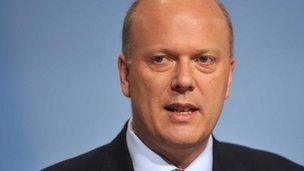Chris Grayling targets 'ill-founded' judicial reviews
- Published

Mr Grayling says there has been a "huge surge" in judicial review cases in recent years
Justice Secretary Chris Grayling has set out plans to tackle what he describes as "ill-founded" judicial reviews which slow down the courts.
To stem the growth in their number, judicial review applications would cost more, with less time put aside to apply and fewer chances to appeal.
Ministers say the changes will not alter the role judicial reviews play in holding them, and others, to account.
Applications for judicial reviews have risen from 160 to 11,200 since 1974.
Of last year's decided applications one in six were deemed suitable for a judicial review to go ahead.
Individuals and organisations can seek a judicial review if they think a decision by a public body has been made unlawfully.
The review, carried out by a judge, looks only at the way the decision was reached - rather than whether it was correct or not.
Some lawyers are concerned that the changes will be used to reduce genuine judicial reviews which hold the government and other public bodies to account.
Justice Secretary Chris Grayling said: "The system is becoming mired in large numbers of applications, many of which are weak or ill-founded, and they are taking up large amounts of judicial time, costing the court system money and can be hugely frustrating for the bodies involved in them.
"I am concerned that judicial review is being used increasingly by organisations for PR purposes. Often the mere process of starting a Judicial Review will generate a headline.
"We want go back to a system where Judicial Review is available for genuine claims, which provides people with access to Judicial Review where they need it but weeds out the cases that should frankly never be there in the first place."
Labour's Shadow Justice Minister, Andy Slaughter, said however that he was not surprised the government "wants to close the door on independent scrutiny of its actions".
He added: "Judicial review is a primary way of citizens holding the state to account, exposing wrongdoing and incompetence in government.
"At a time when developers are being given the green light to tear up the greenbelt, catastrophic decisions like the west coast mainline franchise are costing billions and basic human rights are threatened by welfare cuts, the power of the courts to review the arbitrary exercise of power by politicians has never been more relevant."
The consultation on how to improve the judicial review system, external runs until 24 January.
The government says its proposals are the latest of a series of moves to make the justice system more efficient and effective.